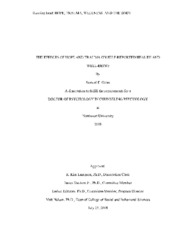| dc.contributor.author | Gales, Samuel E. | en |
| dc.date.accessioned | 2019-06-20T20:25:02Z | |
| dc.date.available | 2019-06-20T20:25:02Z | |
| dc.date.issued | 2018-07-25 | en |
| dc.identifier.uri | archives.northwestu.edu/handle/nu/44439 | |
| dc.identifier.uri | archives.northwestu.edu/handle/nu/44439 | en |
| dc.description.abstract | The purpose of this research was to study the degree to which hope relates to part of the human experience, specifically for those who have been affected by childhood trauma. Stress resulting from trauma affects the mind and body, with effects seen across the lifespan. It is assumed hope is connected to the human experience and it has been found to minimize the impact of adverse outcomes of life. In the present study, an examination of whether hope shares a bond with physical and emotional health for those who have experienced adverse childhood experiences (ACEs) is studied. Another aim was to understand the relationship between levels of self-perceived hope, posttraumatic growth, and positive adjustment after trauma. The Adverse Childhood Experience Questionnaire (Appendix C), the Trait Hope Scale (Appendix E), the RAND 36-SF questionnaire (Appendix F), and the Posttraumatic Growth Inventory (Appendix G) were utilized in this study. Participants obtained through snowball sampling via Facebook completed four surveys that measured ACE scores, self-perceived hope, self-perceived adjustment, and self-perceived health. Results of the 93 participants that completed the surveys indicate that hope has a significant negative relationship with ACEs while having a significant positive relationship with self-perceived health. In addition, hope was not found to have a moderating effect within the relationship between ACEs and self-rated posttraumatic growth or the relationship between ACEs and self-rated health. These results did not support the hypothesis tested. The overall importance of hope in the aftermath of ACE's does not significantly affect overall health or growth. However, the information gained enlightens the importance of the relationship between hope and self-perceived health. | en |
| dc.format.extent | vi, 106 pages | en |
| dc.format.medium | PDF | en |
| dc.language.iso | en | en |
| dc.publisher | Northwest University | en |
| dc.rights | This original work is protected by copyright. Copyright is retained by the author(s). Works may be viewed, downloaded, or printed, but not reproduced or distributed without author(s) permission. | en |
| dc.rights.uri | http://archives.northwestu.edu/page/copyright | en |
| dc.subject | Adverse childhood experiences | en |
| dc.subject | Hope | en |
| dc.subject | Well-being | en |
| dc.subject | Posttraumatic growth | en |
| dc.title | The Effects of Hope and Trauma on Self-Reported Health and Well-Being | en |
| thesis.degree.name | Doctor of Psychology in Counseling Psychology | en |
| thesis.degree.level | Doctoral | en |
| thesis.degree.grantor | Northwest University | en |
| thesis.degree.discipline | College of Social and Behavioral Sciences | en |


 Maintained by the Northwest University Library
Maintained by the Northwest University Library